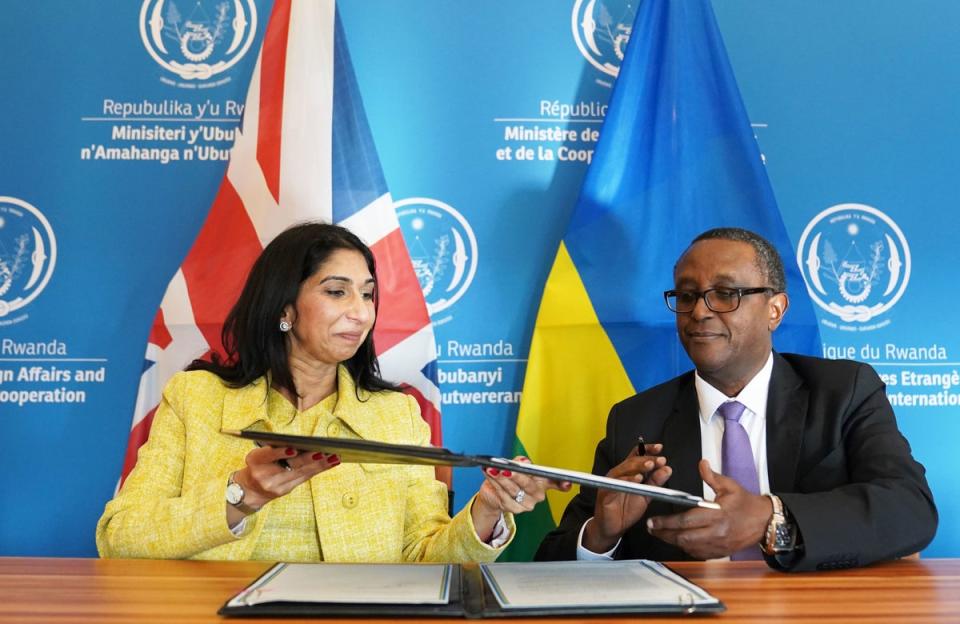Government spends a third of aid budget on asylum seekers in UK as hotel costs soar

The government spent £3.5bn of aid money on supporting refugees and asylum seekers already in the UK last year - one third of Britain’s entire annual budget - while allowing hotel costs to “soar”, a watchdog has found.
The Independent Commission for Aid Impact (ICAI) said the Home Office’s “failure to tackle the asylum processing backlog and competition for scarce accommodation” was taking money away from programmes abroad.
International development funding was also used to support Afghan and Ukrainian refugees brought to the UK on bespoke schemes.
A report said that because the aid budget is capped at 0.5 per cent of GDP, rocketing spending inside the UK meant that the Foreign Office “had to pause all but essential aid and was unable to plan” in 2022.
“One important consequence is that the UK’s ability to respond to global crises and humanitarian emergencies has been sharply curtailed,” its report said.
“This was seen in the limited UK response both to devastating floods in Pakistan and to the worsening drought in the Horn of Africa, which is expected to lead to widespread famine.”
Previous parliamentary reports have warned that the government must address the “factors driving irregular migration”, including climate change, conflict and repressive governments, rather than “focusing narrowly” on trying to stop small boats.
The latest report came after the government announced it was evicting Afghan refugees from hotels, and that those who turn down an offer of alternative accomodation will not receive a second one.
Parliament is currently considering the Illegal Migration Bill, which the government claims will “deter” Channel crossings by enabling it to detain and deport anyone arriving via small boat.
The government has not published the official impact assessment for the plans or information on how much they will cost, amid questions over immigration detention capacity.
Dr Tamsyn Barton, chief commissioner of the ICAI, said: “Soaring in-donor [country] refugee costs have caused major disruption to the UK aid programmes, causing many major aid programmes to be put on hold.
“We found that this diversion has also led to a significant loss in the efficiency and equity of UK humanitarian aid, as in-donor refugee support is an expensive way to use aid compared to supporting crisis-affected people in their own country and region.”
The watchdog found that the Home Office’s failure to address a “critical shortage” of accommodation for refugees and asylum seekers, driven by its record asylum backlog as well as rising Channel crossings, was driving costly spending on hotels.
“The failure to provide timely asylum decisions means that most asylum seekers remain dependent on Home Office-provided accommodation for the full 12 months of the official development assistance-eligible period,” it added.
The report called for the government to consider capping how much of the UK’s aid budget can be spent on in-country refugee costs, after finding that the current situation was “poor value for money”.
The Home Office told the watchdog it was spending £120 per person per night in hotels, including catering and other services, compared to £18 for longer-term accommodation in houses and flats.
“While the Home Office has recently started planning long-term solutions, the short-term nature of its response to date has contributed to the spiralling costs,” the ICAI said, warning that the government did not “effectively oversee the value for money” from lucrative private accommodation contracts.

The report said that the Home Office had provided a “list of improvements” to the management of asylum contracts and sourcing accommodation, but said the ICAI had not seen any evidence to verify or assess the changes.
Labour MP Sarah Champion, chair of parliament’s International Development Committee, said the review confirmed that the Foreign Office needs to protect aid money from the “Home Office’s continued profligate spending”.
She added: “Our valuable aid budget is being squandered as a result of Home Office failure to get on top of asylum application backlogs and keep control of the costs of asylum accommodation and support contracts.
“While there are no limits on spending, there is no incentive for the Home Office to seek value for money or check its spending: the Home Office is a department out of control.”
The review also expressed concern about safeguarding lapses in hotels, particularly for women and girls, and variable standards of services for asylum seekers.
The ICAI made six recommendations to the government, warning that sustaining the current level of in-country spending would “damage to the UK’s aid objectives and reputation”.


